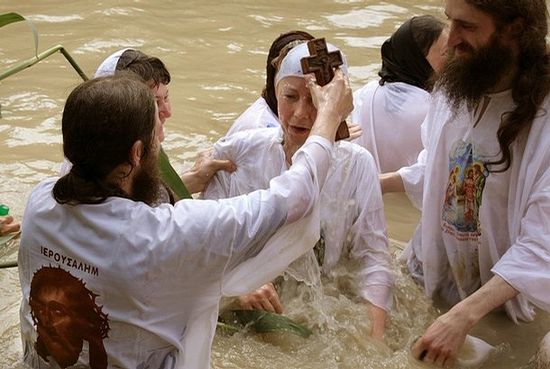Source: Orthodox England
February 19, 2016
The psychology of neophytes (recent or old) is universal because human nature is universal. To quote some real life examples, regardless of whether we are talking about a Protestant who has become a Roman Catholic, a Roman Catholic who has become a Protestant, a Frenchman who has become a Buddhist, an Englishman who has become a Muslim, or a German who has joined the Orthodox Church, neophyte idealism remains the same.
Yes, idealism, and often the bookish sort, because that is what we are dealing with when we deal with neophytes. Neophytes always want to live the ideal, the convert to Roman Catholicism wants to become a Papist now, the convert to Protestantism wants to know the whole Bible by heart by this evening, the convert to Buddhism wants nirvana straightaway, the convert to Islam wants to become a Sufi mystic today, the convert to Orthodoxy reads the Philokalia and wants to become a hesychast just like that.
But it does not work like that. The error of all neophytes is that they want to run before they can walk. By definition that means that they fall over. And when you fall over, you hurt yourself. And when you hurt yourself, you can do one of two things: you can pick yourself up and tell yourself, ‘I have been humbled, now I will listen to voices of experience and like everyone else will first learn to walk before I try to run, all the more so as no-one ever asked me to run, I imposed it on myself’; or you can pick yourself up and walk away in the bitter depression and despair born of pride, giving up the struggle for self-improvement.
This is called lapsing and that is extremely common among neophytes and is always caused by pride, lack of faith. I remember an elderly nun who had been in her convent for fifty years who would say: ‘I may not be a very good nun and certainly I am no saint, but I have seen them all come and go, one after the other, but at least I am still here’. And ‘still being here’ is what salvation is in part about because we cannot be saved without perseverance, which is faith, hope in God’s Providence.
To change deep down takes years. We cannot become saints just like that, as some converts think when they take some out-of-context quotes from the Church Fathers and contemporary saints to justify their pride. That is why God gives us a lifetime to live and we are to make use of every moment in that lifetime, for we do not know how soon that lifetime will end. However, we have to be realistic, we do not impose impossible burdens on ourselves of our own proud will, but measuring ourselves and ask the experienced first before taking on anything. We take on ourselves what God gives us and no more. To be idealistic in everything means to suffer from the pride of illusions and he who suffers from illusions always suffers from disillusions – that is from depression. In other words, depression comes from pride.
Over the decades we have seen many cases. The first error of the neophyte is to confuse the outward with the inward. For example, we have seen the neophyte join the Church and, though he or she is married, they have started dressing like monks or nuns. Such individuals, sometimes with anger and aggression, then despair because reality does not conform to their high ideals. Such rarely remain in the Church for long, either they lapse or else they end up in sects, which are only the exit-doors from the Church. When neophytes do remain, they start dressing normally like everyone else.
Another example is with birth control. Realizing that the ideal of the Church is no birth control, we have seen intellectual and idealistic neophytes have large numbers of children – whom they do not know how to bring up and as a result fall into depression. Common sense (though not idealism) tells us there are cases where we have to choose the lesser evil. There are non-abortive methods of contraception, compromises with the ideal, but they do allow us to bring up some children properly, children who then stay in the Church.
Some would say that they will live without contraception, and so they simply do not have sexual relations. However, we have also seen the result of such decisions in the wrecks of two marriages, where one woman sought comfort with another man because her husband refused her the affection that she so desperately craved, and where one man went off with his secretary. Contraception: we do not bless it, but we allow it as the lesser evil.
In the average parish let us first have the humility to follow average Orthodox. We certainly venerate the saints, but we are not saints and we have no pretensions that we are or will become saints. Yes, we are climbing a ladder to heaven, but we are only on the first rung and at the end of our lives we may only get to the second rung. We do not imagine anything else.
Yes, we are not good Orthodox, but what we do know is that we are doing our best. That is not very much, but our hope is anyway not in our own feeble efforts, but in the mercy of God, which alone can save us. Average people are the people to imitate first. Let us recall the words of the Gospel: ‘In your patience you possess your souls’.





When it comes to the forbidding and absolute prohibition against contraception, the good priest will have to include as some misguided "convert" every holy and God bearing father who has ever addressed the subject, from pre-Nicea onward to people like recently canonized St Paisios of the holy mountain. Synods of bishops from Greece, Russia, Romania, and beyond, have condemned artificial birth control regardless of whether or not it was abortifacient. It is the embarrassment of Orthodoxy that unlike the Latins, modern Orthodox teachers have innovated and betrayed the patristic unanimity that we claim to be the foundation of Christian moral teaching. How does a priest dare to teach others that we should choose among evil choices as the "lesser evil"? How does an Orthodox priest say that we will never be saints? Without holiness no man shall see the Lord, the Scriptures say. Instead he brings up stories of evil being committed against people who held to the Church's actual teaching, and of depression over having many children. This is absolutely worthy of ridicule. I wonder which of my children ought not to have existed... I'll bet that later in life they bless God that I was one of those idealistic converts and not someone who disobeyed the clear voice of the fathers and then had the nerve to call it "humility."
How does this inane raving get posted alongside such gems as Fr Artemy Vladimirov???? Maybe you should tell Fr Artemy that his traditional teaching against contraception is just because, in the words of this article, he is a naive convert! There are other more appropriate words to describe such soul-killing vomit, but I think I've said enough. Forgive me.
I enjoyed your article very much. I see myself in much of what was written in the first paragraph or two. I was raised in the Disciples of Christ denomination as a youngster until age 16. When I went to college I experimented with Assembly of God type denominations, the Southern Baptists, the United Methodists, and Roman Catholicism. Eventually, I became acquainted and later as friends with a parish priest that I began inquiry with. When I graduated and returned home I clandestinely began the RCIA program at the parish closest to me. Fortunately, as a historian I studied church history, faith, and theology and became enthralled with the original church which is truly orthodox. I believe truly that the Roman church has erred in the schism that led to the separation of the Eastern Byzantine church from the Western Latin church. Unfortunately, much like the Roman church the Orthodox church does not and will not accept me because of my homosexuality. So, even though I am compelled to believe in the Orthodox faith as it was intended in the 3rd century I cannot realize that which my heart draws me to. There is no easy solution to my debacle, nor am I expecting the church to make exceptions. But I would love to see a time when I as a human being could be accepted in the authentic church.
Thank you again for your writing, Fr. Andrew.